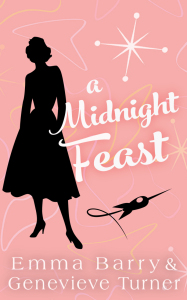 If there’s one underused trope Miss Bates loves, it’s marriage-in-trouble, which is why she pounced on Barry and Turner’s novella-ish, category-length A Midnight Feast. It centres on the leader and doyenne of the space-race, 1960s-set American astronaut world that makes up Barry and Turner’s Fly Me To the Moon series, Colonel Mitch Dunsford and his wife of twenty-years-and-six-kids, Margie.
If there’s one underused trope Miss Bates loves, it’s marriage-in-trouble, which is why she pounced on Barry and Turner’s novella-ish, category-length A Midnight Feast. It centres on the leader and doyenne of the space-race, 1960s-set American astronaut world that makes up Barry and Turner’s Fly Me To the Moon series, Colonel Mitch Dunsford and his wife of twenty-years-and-six-kids, Margie.
Barry-Turner have produced an adept narrative: alternating, especially in the first half, between Mitch and Margie’s present estrangement, set in 1965 Houston, and their courtship, young marriage, and flat middle years of care and children on her part and demanding, exhilarating career-making on his. Barry-Turner adroitly portray a marriage void of friendship, connection, and mutual desire, interspersed with chapters that chronologically fill in the intervening years, starting with a heady, whirlwind courtship set in 1945. In that sense, Barry-Turner tell a whole lot of story with a circumspect page-count; yet, their carefully-crafted snapshots of love, lust, affection to benign neglect and cutting indifference still allow the reader to get to know and possibly like their hero and heroine. The narrative is also beautifully bound together with a holiday sequence: starting with a make-it-or-break-it Thanksgiving for Mitch and Margie’s troubled marriage to a lovely Valentine-Day’s-1966-set epilogue.
Barry-Turner are strong writers. They can turn a phrase and set a scene and write mean dialogue. They’ve grown as writers since their initial, individual efforts, and they’ve also grown together as a writing team. It was the quality of the writing that kept Miss Bates fulfilling the Kindle page count. There are great little moments of poignancy and they’re most evident in the writing. The story opens when Margie and Mitch’s Thanksgiving guests bail and their children are away visiting grandparents. Suddenly, they’re confronted with each other, just the two of them, together and so so apart, estranged. Barry-Turner give a hopeful moment of near-recognition, of near-return to what Mitch meant to Margie when they first met:
Then, something strange happened: warmth flickered across Mitch’s face. He looked as he had when Margie had first seen him, young and uniformed and irresistible. “So it’s the two of us for Thanksgiving?” he asked. His voice was low and warm, the last embers in the fire grate at midnight. Her heart was going a mile a minute now. She’d forgotten how deep the brown of his eyes was. But it passed, and he was only her husband again.
Miss Bates loved the near-magic of Mitch for Margie and then his prosaic ordinariness, “only her husband again.” The narrative is built on Margie’s recapturing what she used to feel for Mitch. These are Barry-Turner’s strongest moments, the early bits, when Margie and Mitch struggle to make their way back to each other. Their tenderness, foiled by Margie’s brittle anger and Mitch’s pathetic contriteness, the narrative tension this elicits, works really well.
And then, it doesn’t. Somewhere along the way, making a point about what the 1950s and early 60s was like for women becomes very important. Mitch in particular is leached of verve and bravado. He’s suddenly, yes, doing all the repentant things he ought: he folds laundry and drives the kids to music lessons and is home for dinner. He’s goes from being Don Draper to Gomer Pyle, but Miss Bates was hoping for William Holden. Margie grows and comes into her own and overshadows Mitch. For many a romance reader, this is welcome and worthy of celebration, but Miss Bates didn’t care as much what happened between Mitch and Margie: Mitch’s total recapitulation just wasn’t that interesting. Nevertheless, Barry-Turner’s writing and scene-setting and zippy dialogue will draw her back, but for now, with Miss Austen, A Midnight Feast is “almost pretty,” Northanger Abbey.
Emma Barry and Genevieve Turner’s A Midnight Feast is self-published. It was released on October 30th and may be procured at your preferred vendors. Miss Bates received an e-ARC from the authors.
Rate this:Share this:- More





